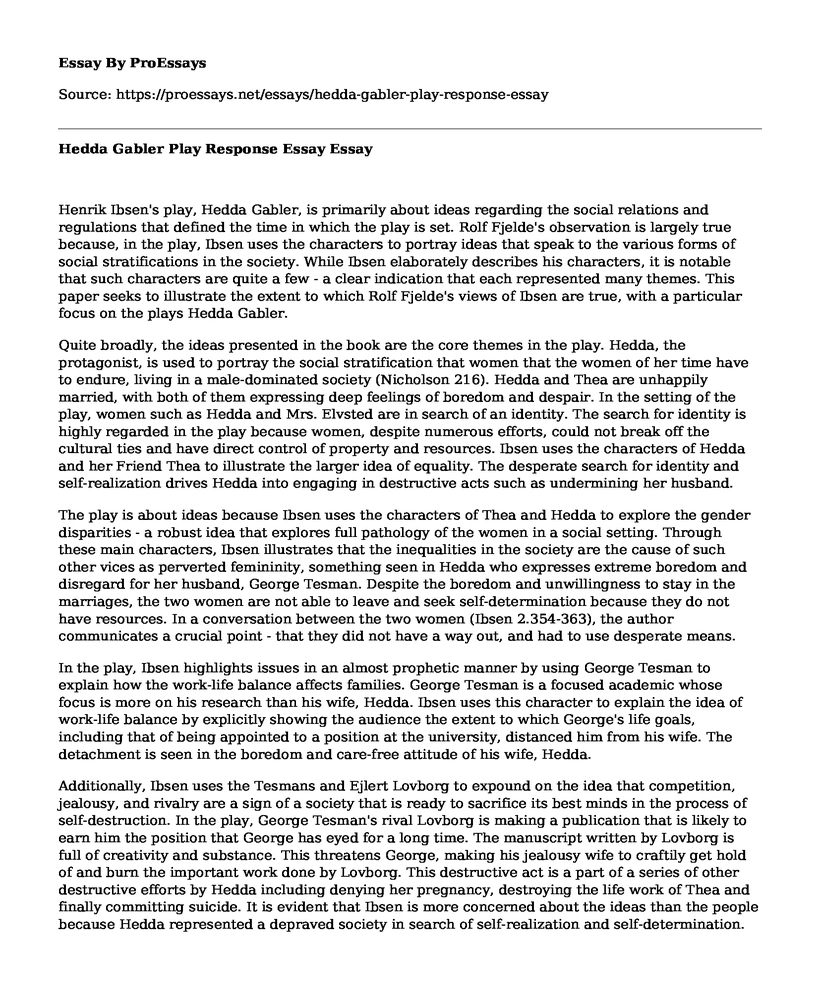Henrik Ibsen's play, Hedda Gabler, is primarily about ideas regarding the social relations and regulations that defined the time in which the play is set. Rolf Fjelde's observation is largely true because, in the play, Ibsen uses the characters to portray ideas that speak to the various forms of social stratifications in the society. While Ibsen elaborately describes his characters, it is notable that such characters are quite a few - a clear indication that each represented many themes. This paper seeks to illustrate the extent to which Rolf Fjelde's views of Ibsen are true, with a particular focus on the plays Hedda Gabler.
Quite broadly, the ideas presented in the book are the core themes in the play. Hedda, the protagonist, is used to portray the social stratification that women that the women of her time have to endure, living in a male-dominated society (Nicholson 216). Hedda and Thea are unhappily married, with both of them expressing deep feelings of boredom and despair. In the setting of the play, women such as Hedda and Mrs. Elvsted are in search of an identity. The search for identity is highly regarded in the play because women, despite numerous efforts, could not break off the cultural ties and have direct control of property and resources. Ibsen uses the characters of Hedda and her Friend Thea to illustrate the larger idea of equality. The desperate search for identity and self-realization drives Hedda into engaging in destructive acts such as undermining her husband.
The play is about ideas because Ibsen uses the characters of Thea and Hedda to explore the gender disparities - a robust idea that explores full pathology of the women in a social setting. Through these main characters, Ibsen illustrates that the inequalities in the society are the cause of such other vices as perverted femininity, something seen in Hedda who expresses extreme boredom and disregard for her husband, George Tesman. Despite the boredom and unwillingness to stay in the marriages, the two women are not able to leave and seek self-determination because they do not have resources. In a conversation between the two women (Ibsen 2.354-363), the author communicates a crucial point - that they did not have a way out, and had to use desperate means.
In the play, Ibsen highlights issues in an almost prophetic manner by using George Tesman to explain how the work-life balance affects families. George Tesman is a focused academic whose focus is more on his research than his wife, Hedda. Ibsen uses this character to explain the idea of work-life balance by explicitly showing the audience the extent to which George's life goals, including that of being appointed to a position at the university, distanced him from his wife. The detachment is seen in the boredom and care-free attitude of his wife, Hedda.
Additionally, Ibsen uses the Tesmans and Ejlert Lovborg to expound on the idea that competition, jealousy, and rivalry are a sign of a society that is ready to sacrifice its best minds in the process of self-destruction. In the play, George Tesman's rival Lovborg is making a publication that is likely to earn him the position that George has eyed for a long time. The manuscript written by Lovborg is full of creativity and substance. This threatens George, making his jealousy wife to craftily get hold of and burn the important work done by Lovborg. This destructive act is a part of a series of other destructive efforts by Hedda including denying her pregnancy, destroying the life work of Thea and finally committing suicide. It is evident that Ibsen is more concerned about the ideas than the people because Hedda represented a depraved society in search of self-realization and self-determination.
Ibsen expounds on the idea that weak morals threaten social and economic development through the character of Ejlert Lovborg, who had lived a controversial life in the past, but had reformed and was making remarkable progress. In the play, Lovborg says, "...no, it is only the moral victory I care for..." (Ibsen 2.267). Here, it is the idea that is important - that having a good moral fabric, or reforming some ways in the society can foster social and economic progress. Upon reformation, Lovborg appears focused, until Hedda tricks him back to the social evil of reckless drinking, later losing his creative work.
Conclusion
In conclusion, it is clear that from the preceding review and response, Ibsen, in her Play Hedda Gabler, is more concerned about the ideas than the people. Characteristic of Ibsenite drama, Hedda Gabler is a portrayal of powerful ideas through the characters. It is also evident that the play is more about ideas than individuals because Ibsen presents us with a group of characters that are not integrated but characterized by human connections that are delineated and interrelated in a complicated way. Ibsen does not concern himself with creating neatly interwoven connections that would seek to endear the characters to their audience; his primary concern is to use the characters as vehicles to deliver his ideas to the audience.
Works Cited
Ibsen, Henrik. Hedda Gabler. The master builder. Vol. 10. Scribner, 1917.
Nicholson, Mervyn. Male Envy: The Logic of Malice in Literature and Culture. Oxford: Rowman and Littlefield, 1999. Print.
Cite this page
Hedda Gabler Play Response Essay. (2022, May 09). Retrieved from https://proessays.net/essays/hedda-gabler-play-response-essay
If you are the original author of this essay and no longer wish to have it published on the ProEssays website, please click below to request its removal:
- Symbolism Essay Example: A Seat in the Garden by Thomas King
- Do Media and Social Media Shape What We Believe - Research Paper Example
- Social Media Marketing Business Plan
- Comparative Essay: Renoir, Luncheon at the Boating Party and Caravaggio, Narcissus
- Modernization of Tonnies, Durkheim, Weber, And Marx: Assignment Example
- Essay Example on America's Judge Marilyn Milian: A 41-Minute Courtroom Drama
- Paper Example on American Factory: Hope and Frustration in Uneasy Union







